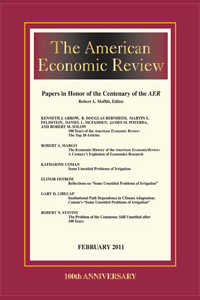
Munshi, K. and Rosenzweig, M.
Networks and misallocation: insurance, migration, and the rural-urban wage gap
American Economic Review
Vol. 106(1) pp. 46-98 (2016)
Abstract: We provide an explanation for the large spatial wage disparities and low male migration in India based on the trade-o between consumption-smoothing, provided by caste-based rural insurance networks, and the income-gains from migration. Our theory generates two key empirically-veri ed predictions: (i) males in relatively wealthy households within a caste who bene t less from the redistributive (surplus-maximizing) network will be more likely to migrate, and (ii) males in households facing greater rural income-risk (who bene t more from the insurance network) migrate less. Structural estimates show that small improvements in formal insurance decrease the spatial misallocation of labor by substantially increasing migration.
Author links:
Publisher's Link: http://dx.doi.org/10.1257/aer.20131365 ![]()
Open Data link: https://www.aeaweb.org/aer/data/10601/20131365_data.zip
Cambridge-INET Working Paper Version of Paper: Networks and Misallocation: Insurance, Migration, and the Rural-Urban Wage Gap, Munshi, K. and Rosenzweig, M., (2015)
